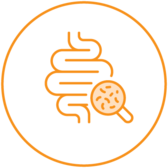The food you eat fuels not just your body, but also your brain. Research shows that a diet rich in foods like fruits, vegetables, legumes and healthy fats can support brain health and may help manage Parkinson’s symptoms.
Eating well doesn’t have to be overwhelming. Whether you're navigating food sensitivities, medication timing or just figuring out where to start, here are simple steps that can help.
Eating Well With Parkinson's
Whether you want to boost brain health, limit Parkinson’s risk or ease symptoms, food is a tool you can use to feel and live better. Rachel Dolhun, MD, DipABLM, and movement disorder and culinary medicine specialist Erin Presant, DO, explain.

Tips for a Brain-Healthy, Parkinson’s-Friendly Diet
Eating well with Parkinson’s disease (PD) isn’t about perfection — it’s about choosing foods that fuel your brain, support your digestion and help you feel your best. A whole food, plant-forward approach, inspired by evidence-based diets like the Mediterranean and MIND (Mediterranean-DASH Intervention for Neurodegenerative Delay) diets, can offer benefits for both motor and non-motor symptoms.
You don’t need to change your diet overnight. Instead, look for ways to make small, manageable changes like adding more fruits and veggies to your plate or cutting out added sugars where you can.
When thinking about how to give your diet a boost, consider the following:
- Focus on whole, minimally processed foods. Choose foods in their natural state, like fresh fruits, vegetables, whole grains, legumes and nuts.
- Center your meals around plants. While you don’t need to ditch animal-based proteins altogether, you should aim to include a healthy mix of plant-based ingredients in your diet to support brain and gut health.
- Limit red meat, added sugar, butter, dairy and packaged foods. These can worsen inflammation and impact digestion.
- Make it your own. Adapt healthy eating habits to your tastes and cultural traditions. Also adapt meal planning to what is most feasible considering your symptoms. Consider purchasing pre-chopped vegetables and meal kits or using a grocery delivery service to make meal prep simpler.
- Support digestion with fiber-rich foods. Prunes, beans, whole grains and vegetables can help manage constipation — a common symptom of PD.
- Choose what works for you. Whether you enjoy cooking or rely on healthy meal delivery, consistency is key.
Also think about medication timing: Taking levodopa too close to a high-protein meal can reduce the effectiveness of the drug, resulting in more “off” time. If this happens, consider taking medication on an empty stomach, either 30 minutes before or 60 minutes after a meal.
Learn more about diet and nutrition and Parkinson’s disease.
With the Parkinson's Buddy Network, you'll find the support and resources you need to make healthy eating part of your regular routine.
Eating Well with Parkinson’s
-

Eating to Boost Brain Health
In this webinar, our expert panelists explain how what you eat can affect Parkinson’s symptoms.
-

Managing GI Symptoms
In this podcast, experts discuss the link between gastrointestinal health and brain disease and offer tips on managing constipation, nausea and bloating.
-

Your Guide to Diet and Brain Health
Learn how to boost brain health, limit Parkinson’s risk and ease PD symptoms all through the power of food.
The Gut-Brain Connection
The gastrointestinal tract, or gut, plays a powerful role in brain health and diseases such as Parkinson’s.
